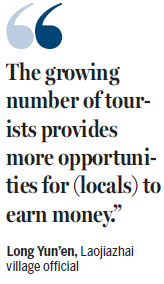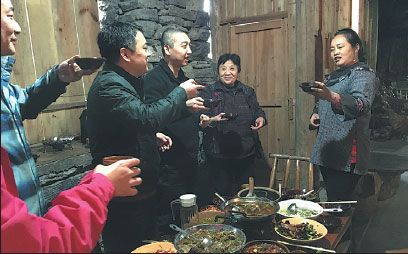Modern tourism benefits hosts and guests alike
Groups of tourists sat by the fireplace at a small restaurant in Shanjiang town in Fenghuang county, chatting and laughing with dozens of pieces of pork hung on a nearby beam, dripping oil into the smoke above the fireplace.
Ma Jinmei, a 47-year-old Miao woman, is the owner of the restaurant. She walked toward the table, holding a bowl of liquor and singing a song in the Miao language for the guests.
"The lyrics mean 'we can only cook a simple meal, hoping you don't mind and have a good time here', " said Ma.
At Ma's restaurant, the meal for tourists includes sour soup, crispy fried rice and smoked pork.
"They are all our traditional foods," said Ma. "In 2014, I took a trip to Philadelphia in the United States and saw the culture of the Indians well preserved. After that, I decided to open a Miao-themed restaurant to promote our culture."
According to Ma, the business was opened by about 10 local villagers, through pooling of land or working for the restaurant. The villagers can also earn money by selling their pigs or leasing farmland. The average income of each person was nearly 40,000 yuan ($5,800) a year.

"I began to do tourism-related business in 2006. I think it's the quickest way for the locals to gain wealth," she said.
She said last year, their smoked pork was sold to Hong Kong and Shenzhen, with a gross revenue of 1 million yuan.
Long Yun'en, an official at the Laojiazhai village in Shanjiang town, Fenghuang county, said villagers would benefit from the development of tourism.
The village is one of the scenic spots on the 92.9-kmlong sightseeing route under construction in Fenghuang county. The village can be accessed by boat after visiting a mountain valley - an experience reminding people of the renowned Peach Blossom Spring, a story by Jin Dynasty (AD 266-420) poet Tao Yuanming, describing the chance discovery of an ethereal utopia where the people lead an ideal existence in harmony with nature.
"In the past, villagers planted and sold rice with a price of 4 yuan per kilogram. They could just barely make ends meet," he said. "The growing number of tourists provides more opportunities for them to earn money."
Tian Ruyong, deputy head of Fenghuang county, said: "I believe developing tourism can help about 68,000 people in Fenghuang to get rich since most of them live in the deep mountains which have rich tourism resources."
He said villagers could profit from tourism through different approaches, such as renting their houses or land, getting jobs in the scenic areas, opening restaurants or stores, or participating in the production of tourism-related commodities.
"We expect that more than 70 percent of the locals will benefit from tourism in direct or indirect ways within five to seven years," said Tian.
Chen Meiling contributed to the story.
|
Ma Jinmei (right) serves guests at her restaurant in Shanjiang town. Chen Meiling / China Daily |
(China Daily 11/16/2016 page12)















